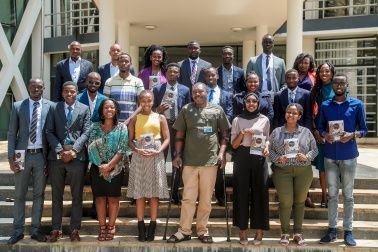“As border communities face a silent threat due to COVID-19 affecting local health and livelihoods, young people have to support vulnerable communities by creating resilience through sensitisation and putting in place mitigative innovations.” With this statement, Jean Claude Mugisha, EAC Youth Ambassador, outlined the role of the youth to engage border communities in the fight against COVID-19. The results of this engagement are the focus of a new report launched jointly by the EAC Youth Ambassadors (EAC YAP) and GIZ Support to the African Union Border Programme (GIZ-AUBP) on the 27th November 2020 at the EAC Secretariat in Arusha, Tanzania.
Since the outbreak of COVID-19 in East Africa, border areas have been critical zones with restrictions measures to prevent cross border transmissions. These restrictions further created challenges on economic activities and reportedly exacerbated cross-border trafficking. One example has been the stigmatization of cross border truck drivers transporting essential goods in the EAC region being perceived as carriers of the virus in border areas such as Namanga (Tanzania-Kenya). This stigmatization worsened especially when the drivers stopped at borders engaging with border communities for service such as food, and accommodation.
A joint online and sms-based sensitisation campaign by EAC YAP and GIZ-AUBP covered in the new report tackled these aspects and ensured that communities understand facts about the disease and know how to protect themselves without stigmatising a specific group. EAC YAP in Burundi, Kenya, Tanzania, Uganda and Rwanda have been reaching out to communities at EAC borders sensitising local communities as well as border agencies on protection and prevention of COVID-19 in line with the EAC Regional COVID-19 Response Plan. Ruth Ogolla, EAC YAP, pointed out during the report launch, that superstitious beliefs were still present in border communities making people more vulnerable to infection. “It is the role of youth to engage with communities and let them know what information is correct.”
Additionally, EAC YAP have been providing an exchange platform between border communities and national as well as regional authorities on communities’ concerns and suggestions on stopping cross-border transmission of the virus. Furthermore, a media campaign through local community radios informed border communities on best approaches to conduct trade and cross border movements during the pandemic while respecting the measures taken by relevant authorities. These radio spots have been derived from interviews conducted by EAC YAP with national and regional authorities which addressed challenges faced by the border communities due to the pandemic.
During the report launch, Mohamadou Abdoul, Advisor GIZ-AUBP, stressed the importance of engaging border communities during the COVID-19 pandemic as part of regional integration efforts, “Border development is an integral part of regional integration since borders are natural areas to enter the implementation of regional and continental policies.” Petrider Paul, EAC YAP, pointed out that post-COVID more direct youth engagement with border communities would support peace and security in the EAC region.
In line with this, the report’s conclusion outlines that border zones need to be prioritised as part of the regional and continental development agenda as these are areas which accelerate movements of people as well as services that enable the socio-economic and political prosperities of neighboring counties. EAC YAP and GIZ-AUBP will continue working to this end.
Read the whole report here. Photo: ©EACYAP
